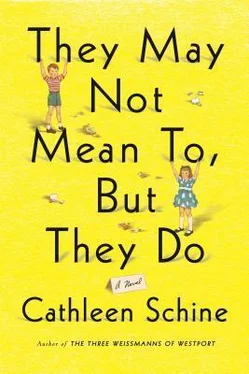Molly had gotten her a medical-alert contraption that came with a wristband with a button on it. Sometimes she pushed the button by accident and a man’s voice from the machine asked her if she was all right. It was company.
Wanda stayed on, going home only on the weekends to tend to her alcoholic husband. She made breakfast for Joy. She practically fed it to her with a spoon. Wanda missed Aaron, too. Sometimes they cried together. Sometimes they cleaned drawers.
Walter appeared once to pick up a sweatshirt he’d left behind. He helped her change two burned-out lightbulbs in the kitchen ceiling fixture. He said he would come back and make Foo-foo for her one day. When he left, his absence was acute.
On the weekends, Elvira came at night. Joy would not stay alone. Alone was impossible, it made her shiver, it made her head swim, it made her heart pound, it made her knees buckle, it made her ears ring.
Her children lived in some other world, one that she could see but had left behind, like the wake of a ship. Their lives foamed and splashed while she hurtled forward, away from them, but toward nothing. Well, toward something, and they all knew what that something was.
There wasn’t enough money for Elvira or Wanda. She was spending like a drunken sailor, an old decrepit drunken sailor. The children offered to help pay, which was kind but humiliating. And she knew they couldn’t afford it. An archaeologist and an environmentalist? They were hanging on by a bourgeois thread. She understood she would have to stay alone eventually. She listened to the wind rattle the windows and knew she was abandoned. She told Molly and Daniel she would not be on the dole.
The first night alone was long and she paced from the living room to the bedroom in her nightgown, like a ghost, a skinny, crabby old ghost. The sirens wailed outside, and she paced and wept and took her own pulse and used the toilet and ate crackers and knew she would faint. She paced some more, and the streets became quiet, even the sirens stopped, and she took her pulse again, as if her pulse might account for the silence, and paced some more and waited.
What am I waiting for? she wondered. Whatever it was, it was crucial and elusive. She could hardly breathe. She tripped on the edge of the rug in the hall, but did not fall. She lay on the couch and cried, bitterly and loudly. “I don’t care who hears me,” she called out to the empty house.
In Los Angeles, it was January and it was springtime. Molly saw a hermit thrush. Hummingbirds flitted in and out of white flowers shaped like bells. Pink buds of jasmine hung over the fence ready to burst into bloom. At the beach, surfers slid into the waves with the garish sunset behind them. Finches began to sing. She took one class to Catalina each week to photograph a cave painting and map the area around it. They used a software program that had originally been developed by NASA for the study of photographs of Mars.
“Mars,” her mother said when Molly told her about the project. “Well, well. Digital tracing. Isn’t that nice.”
“I knew you’d be interested.”
“Oh, of course.”
Molly told her about the bits of ocher the digital tracing had connected, and if her mother sounded less enthusiastic than Molly had expected, Molly attributed that to the weather. The weather was terrible in New York. It snowed and the bitter wind blew, and Joy could not leave her building.
“Well, this will cheer you up, Mom. One of the grad students in engineering built a drone and we attached a 3-D camera and…”
Joy drifted from room to room, listening, aimless, trapped.
It wasn’t that Joy expected her daughter, and certainly not her son, to come live with her. They had their own lives, just as she had once had her own life. She did expect something from them, though, something they were not providing, she couldn’t put her finger on it. Danny was coming once a week for dinner now, Molly planned a trip to New York in the near future, and Joy waited eagerly for their visits. But visits predicted their own end, and an end to a visit meant she would be alone again.
There is a difference between solitude and loneliness, she thought, and wondered what it was.
She should have spent more time with her own mother. She should have moved in with her mother to take care of her, she saw that now. So what if her mother’s apartment had been an L-shaped studio? So what if her mother kept it at 102 degrees and could not stand the smell of any food cooking except white rice, and so what if she talked and talked and talked and lived in the past? Now that Joy was older, she understood her mother. It was cold , that was why the heat in the apartment was turned up so high. Her mother’s ceaseless talking was an activity , a way for her to be alive. As for living in the past, the past was all that was real.
Joy would move right in with her mother now, if she could. Daniel and Molly were not old enough, not lonely enough, not cold enough to understand. And what would they do with their wives? And how was it that she had a daughter and a son and they both had wives, anyway?
No one, not even an old lady, wants to live in someone else’s house. Both Molly and Daniel had asked her to move in with them, naturally, just as she had asked her own mother to move in with her. They were good, devoted children, just as she had been. They didn’t really mean it, just as she had not really meant it.
Rich or poor, her mother used to say, it’s better to have money.
Aaron, you were not a prince among men. You were not. You were a weak man. You squandered your fortune like a prince, but you were not a prince. She thought fondly of his affectations of dress, the tweed cap when other men wore brimmed hats, the custom-made English shirts and shoes. How handsome he was, his beard groomed, his hair tousled. It had been so long since she had thought of him as handsome. But now she had trouble picturing him when he hadn’t been handsome, when he’d grown bent and stiff and hollow, when his lips were chapped and his teeth dulled, when his eyes went blank, when his clothes devolved into the clothes of a small child, the elastic-waist sweatpants, the hooded sweatshirt that he could not zip himself. Those images were fading. Instead, she could feel her head on his shoulder and his hand running through her hair. She could hear his breath in her ear, feel it, soft and warm. As she tried to fall asleep each night, she saw him as she had first seen him, a young man with no beard, his eyes a watery blue, his jacket handmade in Scotland, she later discovered, his large hand held out as he asked her to dance.
The memories did not comfort her. They made her feel the years that had passed and that, like Aaron, would never return. They made her old. Sometimes, when she got up to go to the bathroom, she caught sight of herself in the mirror and thought it was her grandfather. All she had to do was spit some tobacco. The smell of her grandfather and his chewing tobacco came back to her, and she got back into bed, sleepless and sick to her stomach.
When Danny came to dinner, he always said, “I’ll bring a roast chicken from Gourmet Garage so you won’t have to cook.”
Cook? She could barely recall when she had last cooked. She did make toast. She sometimes boiled an egg. But she would not be cooking Danny a nice dinner like a proper mother, like a proper hostess, she didn’t have the strength, he was right about that. She decided she would make the table look pretty. She would use the silver. She would light candles.
She bent down and pulled out the bottom drawer in the kitchen cabinet, where the tablecloths were kept, then stood up holding a fresh bright white embroidered cloth and banged her head on a cabinet door she’d left open. She cried from pain and frustration, but forced herself on, into the dining room, to spread the cloth. But how could she spread the beautiful white cloth? The dining-room table was covered with mail and file folders; there was a tray with an egg-stained plate and a pink jammy crust of bread; large bottles of pills dozed on their sides like sea lions; magazines and catalogues and unread newspapers had slithered out from piles that had then collapsed and fanned across yet another egg-stained plate. A pile of bills, three piles of bills, each topped with a yellow Post-it that said Urgent. Joy sat at the table crying and trying to decipher the bills. They made no sense. She began to dial Molly’s number to tell her the dining-room table was a mess, as if Molly should fly in from California to straighten it up, then caught herself and hung up.
Читать дальше












